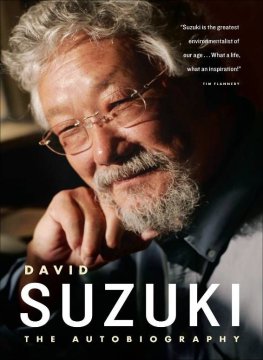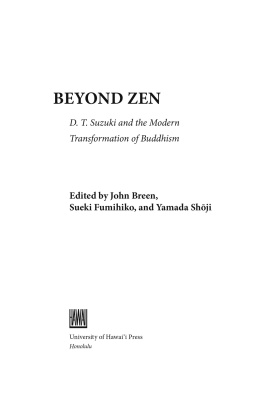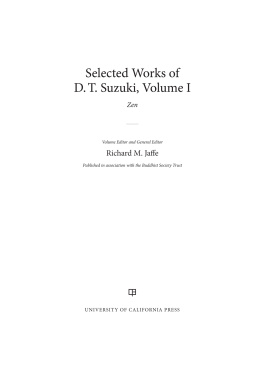Izumi Suzuki
TERMINAL BOREDOM
STORIES
Translated by Polly Barton, Sam Bett, David Boyd, Daniel Joseph, Aiko Masubuchi, and Helen OHoran
This morning a boy passed by my house.
When I told my sister Asako about it, she just said, Dummy, you know there arent any boys around here.
And she was right.
Long ago, the Earth was peopled only by women. They lived in peace until one day a certain woman gave birth to a child unlike any that had come before: its body was misshapen, it was rough and careless in everything it did, and it made a great deal of trouble for everyone before it produced a few offspring and then died. Such was the advent of man. From there, the number of men increased steadily. It was they who invented war and its requisite implements. Worse still, they began to toy with notions like revolution, work, and art, wasting their energy on all manner of abstract pursuits. And they even had the audacity to claim that this, this was the greatest characteristic of mankind this zealous pursuit of adventure, romance, all things that were utterly useless in everyday life. Though men were adults they were children, seemingly complex but as simple as could be; they were utterly unmanageable creatures.
Women had something as well, something called love, but this was much more concrete. It was putting up with a crying baby, changing its diapers even though you were exhausted. It was sharing any food you found with the weak little beings in your care. But not with outsiders. Because if you did that, you and your bloodline would not survive.
As the number of men increased, the women had to keep a close eye on each and every one of them. This was a truly onerous task, but most women seemed to have the knack for it. They had to safeguard home and family.
With the passage of many long years, men came to dominate society through violence and cunning, and thereafter they made nothing but war. They seemed to find their raison dtre in conflicts both great and small. War found its way even into everyday life, and so were born traffic wars and admissions wars. Such terms became so common that the word war lost all meaning. This deplorable situation was of course the mens fault. And, when the traffic snarls and college entrance competition got so bad that people could hardly bear it, they replaced the word war with hell, coining phrases like traffic hell and exam hell.
Factories continued to operate, and the age resounded with hymns of progress and harmony. But then, in the latter half of the twentieth century, a strange thing happened: the male birth rate began to decline. This was apparently due to something called pollution. The men who invented the steam engine probably never expected to set in motion events that would bring an end to their own kind.
In any case, men became scarce. For some reason women had developed the habit of each finding a particular man to love, so they were terribly sad about this. Nevertheless, the number of men continued to dwindle.
Nowadays, youll never even lay eyes on one unless you visit the Gender Exclusion Terminal Occupancy Zone.
You sure you werent just seeing things?
Asako poured some tea. My confidence evaporated in the face of her question.
Maybe. But afterwards I looked it up in a book, and the clothes he was wearing were a lot like the ones boys wore towards the end of the twentieth century. His hair was short, and he was wearing trousers.
Same goes for me.
Asakos hair was indeed cropped short, and she had on a pair of light cotton bell-bottoms.
I mean, sure, but his trousers were a lot tighter and not so wide at the bottom. And his chest was flat as a board.
There are women like that too, you know.
His whole vibe was different. He was solidly built and tall, with a spring in his step. There was something intense about him.
Wow. Well, looks like youve got all the answers, never mind the fact that youve never even seen a man before. The year I graduated high school we went on a field trip to the Occupancy Zone, but men turned out to be nothing like I expected. They were scraggly and smelled funny, and they all gave me the creeps. Maybe its because theyre stuck in that place, but they all seemed so lazy. Youll understand when you go and see them. Theyre awful. But you said you looked it up in a book. Where did you see a book like that?
The publication of material concerning men is strictly prohibited.
A friends house.
Well, howd it get there?
I guess her mother works for the Information Bureau. My friend doesnt really know either. She opened the door to the study with a hairpin and said I could read any book I wanted.
Such a little hoodlum.
There were lots of films, too.
If that got out, it would mean real trouble. Yko, I know you dont really understand, but that kind of thing could throw society into chaos. I want you to remember this: order is the most important thing. Abiding by the rules. If we all do that, humanity can avoid destruction.
She gave this lecture gently, like a proper big sister.
I poured some milk into my tea. By humanity, you mean women?
Of course. Didnt you learn that in school?
Yeah.
Well, there you go.
And men?
Men are an offshoot of humanity as well, but theyre a deviant strain. Theyre freaks.
But there was a time when they flourished, wasnt there? They dont teach us much about that in school. You only learn about such taboo subjects through whispered conversations among friends. Two or three years back, someone secretly published a pamphlet called On Men, and a friend showed it to me. Eventually the police cracked down and seized all the copies. The culprits were quickly caught and put in a detention facility.
The news posters branded it a dangerous publication because it stimulated curiosity.
My grandmother told me that when she was young they used to deliver the newspaper door to door each morning, and the transportation network extended to every corner of the country. Even now you can go see the massive concrete pillars that used to hold up the highways. You never know when they might collapse, though, so its dangerous to get too close. It was around the same time resources started to become scarce and they scaled back production in the factories that the number of men also started to decrease. We were taught that it was the men who had created that horrifying culture. By the end, they had used up almost all of the oil; the deposits are all but depleted now, so we rely almost entirely on the heat of the sun. Women have been left carefully husbanding the scant resources of a planet stripped bare by men.
Apparently back then there was also something called a TV in every home. I cant even imagine all kinds of programmes coming at you from morning till night, at the twist of a knob. And all for free! I guess something called NHK collected money for it, but towards the end nobody paid anymore. TV was one of womens greatest pleasures. Grandma says when she was a kid she used to watch it every day. Back then girls and boys alike were immersed in exam hell, but her mother didnt give her any grief about school. Grandma wanted to be a singer. She told me so. Apparently at that time, these singers would appear on TV constantly. And since just about everyone watched TV, they were famous, and if you were famous, throngs of people would come to your concerts. I dont really believe the part about everybody watching TV, though. Grandma also told me it was really sad when the TV stations went under and men werent around as much anymore.
Stop talking nonsense and go to bed already Its eight oclock, the electricitys about to get shut off.
And sure enough, just as my sister said this, the already dim bulb went dark. In its wake, the moonlight lay in stripes across the tabletop.













